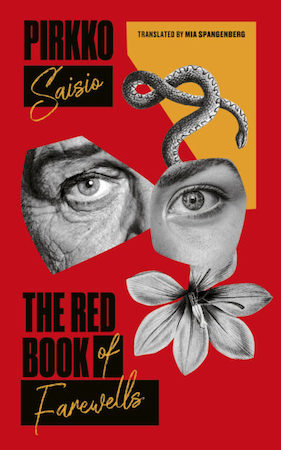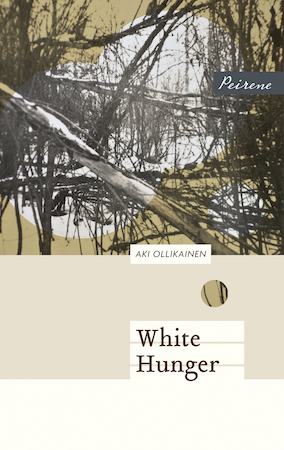Electric Literature recently launched a new creative nonfiction program, and received 500 submissions in just 36 hours! Now we need your help to grow our team, carefully and efficiently review submitted work, and further establish EL as a home for artful and urgent nonfiction. We’ve set a goal of raising $10,000 by the end of June. We’re almost there! Please give what you can today.
While Finland is often depicted as a uniform country in which people are more likely to engage in cold-water swimming than small talk, the population is by no means homogenous, and there is no better place to see this than in the diversity of Finland’s contemporary literary scene.
Shaped by histories and narratives of exclusion and survival, Finnish authors are blurring the lines of genre to tell new stories in luminous, captivating prose. These prize-winning contemporary novels engage with the effects of war and inequality and offer deeply compelling explorations of what it means to be human.
The novel that I translated from Finnish to English is The Red Book of Farewells by Pirkko Saisio. With her experimental prose and long career starting in the 1970s, Pirkko Saisio can be seen as an influence on many of these writers. The Red Book of Farewells offers a beautiful portrait of a young woman finding her voice in 1970s Helsinki.
Here are seven Finnish novels I consider essential reading:
Bolla by Pajtim Statovci, translated by David Hackston
Born to Albanian parents in Kosovo in 1990, Pajtim Statovci fled with his family to Finland when he was two. Themes of exile, identity, and war feature prominently in each of his novels, and in Bolla, his latest, he delivers a tragic love story with his characteristically beautiful and propulsive prose. Set in Kosovo in 1995, the story revolves around Arsim, a newly married university student, and Miloš, a Serb. The two meet one day in a café, and their attraction to one another leads them into a secret but doomed affair: Arsim is forced to flee the war with his family, and Miloš is sent to the front line. They meet again at the end of the novel, broken by their experiences and an unforgiving society who cannot accept them for who they are. The bolla, a snake-like creature from Albanian mythology, appears throughout as an ambivalent symbol of hope and forbidden desire.
The Union of Synchronized Swimmers written and translated by Cristina Sandu
Like Statovci, Cristina Sandu grew up between two cultures, and she was born into a Finnish-Romanian family in Helsinki. In her second novel, she follows the lives of six young women who form a synchronized swim team in an unnamed Soviet bloc country in order to escape to the West. Once a tight unit always moving together in sync, they scatter to places like Helsinki, Rome, and California. These women do not necessarily find happiness or freedom; instead, their stories detail their aching inability to fit in, their desperate attempts to earn money and some semblance of security, and the vulnerability of being female. Each woman’s story delves deep into the heart of loneliness and the harsh realities of trying to survive in society as an outsider.
Purge by Sofi Oksanen, translated by Lola Rogers
A Finnish-Estonian writer, in Purge Oksanen depicts the corrosive effects of fear, torture, and jealousy during Stalin’s purges and the post-war Soviet occupation of Estonia. The story centers on two women, Zara, a sex trafficking victim who manages to escape her captors, and Aliide, an elderly woman who reluctantly takes her in and has her own secrets to hide. Zara is looking for her grandmother Ingel’s home in Estonia, who as it turns out was Aliide’s sister. A chilling drama plays out between them as the chapters alternate between the horrors both women have suffered and their distrust of one another, and it is only at the end of the novel that readers find out whether Aliide will ultimately save her own flesh and blood.
When I Forgot by Elina Hirvonen, translated by Douglas Robinson
In Elina Hirvonen’s accomplished debut, a young journalist named Anna Louhiniitty is trying to come to terms with the trauma of her past: the years she has spent trying to protect her mentally ill older brother, Joona, and the generational trauma she has inherited from her family and the legacy of WWII. She is sitting in a café, attempting to read Michael Cunningham’s The Hours, given to her by her lover Ian, a visiting lecturer from the U.S. It’s just over a year after 9/11, and as Anna processes her memories, she also tells us Ian’s story, who has suffered his own trauma as a bullied child with a father who succumbed to mental illness in the Vietnam War. In Hirvonen’s lucid prose, Anna grapples with her painful memories, as well as those of Ian and her family, and slowly begins to find the words to name her experiences and accept them. As she ends her quiet afternoon in the café, she knows she can go on, one day at a time.
Troll: A Love Story by Johanna Sinisalo, translated by Herbert Lomas
In this masterpiece, a photographer nicknamed Angel finds an abandoned troll cub by the trash cans outside his apartment building. He feels compelled to take the enchanting creature home, and so begins Angel’s obsession with his new companion, which in the novel’s world is a real but very rare species. The novel is interspersed with excerpts from reference works that Angel consults to learn about the troll as well as Finnish novels that highlight the uncomfortable, fearful relationship humans have with other animals. Told in the first person, the narrative perspective also changes and includes various other outsiders who are part of Angel’s world: Ecke, Angel’s young and eager suitor; Dr. Spiderman, Angel’s ex-boyfriend and a veterinarian, and Palomita, an abused Filipino mail-order bride who lives with Angel in the same building. As Angel’s obsession with the troll deepens, he takes ever more desperate steps to hide it, but ultimately he is unable to prevent the violent ending the troll brings about.
The Colonel’s Wife by Rosa Liksom, translated by Lola Rogers
Veteran author Rosa Liksom delivers her darkest tale to date in this exploration of an unnamed woman enamored with fascism and her violent husband and idol known simply as “the Colonel.” The protagonist eagerly joins the Colonel on his trips to Germany in the late 1930s and early 1940s, a time when the Nazi top brass were supporting Finland in its efforts to rebuff Soviet advances on Finnish territory. However, the Nazis eventually turn against the Finns, and in his rage and disappointment, the Colonel becomes increasingly abusive towards his wife. Told in the first person, readers cannot escape the protagonist, who is by turns loathsome and sympathetic. Liksom based the colonel’s wife on a real person named Annikki Kariniemi and thus offers a fascinating portrait of a complex character from the beautiful wild lands of northern Finland.
White Hunger by Aki Ollikainen, translated by Emily and Fleur Jeremiah
This haunting debut novel takes place during the Finnish famine of 1867 which wiped out 15-20% of the population. This novel follows Marja and her young daughter and infant son on their journey south to Helsinki to find food, and the sparse, tightly-controlled prose is gripping in its relentless depiction of starvation and its effects: the desperate attempts to make bread out of lichen (often poisonous), pine bark, and even ground up bones; how a child’s long-empty belly bursts after eating too much thin gruel all at once; the dehumanization of Marja and her children who are abused and denied food and lodging again and again. Their misery is further emphasized by the story of two well-heeled brothers in Helsinki, one a doctor, and the other a government official, who remain personally unaffected by the mass starvation around them. All the while hunger blazes white through the long winter and constant blizzards, leaving only Marja’s infant son to survive the ordeal at the end.


